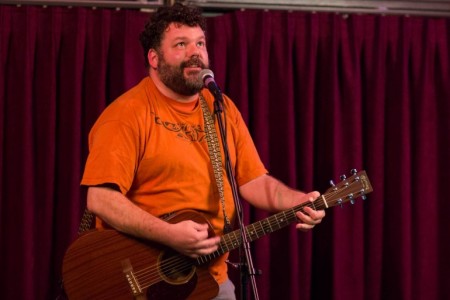Mike’s Tips for Studio Prep
Mike Hickman of Electric Eye recorders offers up these tips to help you prepare for your studio session:
Many musicians get a real eye-opening experience the first time they work with a professional studio. Although as an experienced producer and engineer I can ease the transition for inexperienced musicians, there are still many things to overcome.
What can you do to streamline the session and get the most of your time?
• Pre Production. Pre-production includes everything that should be taken care of prior to entering the studio. Think of cooking a meal. You wouldn’t just go to the kitchen and start cooking. You’ll first need to gather a list of ingredients, find the tools you’ll need to cook with such as pots and pans, schedule an order of what is to be cooked, and figure out who will be doing what, assuming you have a team helping you. That same method applies to the recording studio. You can’t walk into the studio with nothing and expect a hit record by the end of the session. Below are a list of pre-production tasks that you’ll want to take note of.
• Prepare Your Instrument. Though the songs themselves are undoubtedly the most important part of a recording, the tools used in the process are quite important as well, so you should make sure they’re ready for the task! Make sure your guitar has new strings and is properly tuned. Many people overlook this very important step. If you do not know how to ‘set-up’ your guitar take it to someone who does. I can recommend guitar tech is you need that information. Bring extra strings and 9 volt batteries if you use pedals. I also have a variety of acoustic and electric guitars and basses, keyboards and amps available. Drummers should carefully tune their drums and make sure to have plenty of sticks available. Even singers should focus on preparing their “instrument” too. If you’re a vocalist, it’s a great idea to make sure that in the days leading up to the recording you rest your vocal cords, drink plenty of water, and get enough sleep so that your voice is sounding good.
• Structure. Print out a lyric sheet that also includes chord changes and the general structure of the song. This will help tremendously in communicating effectively with the engineer and other musicians when trying to work out specific parts. Heck, go the extra mile and print out a few for everyone involved.
• Tempo. Learn about tempo. Decide the right tempo for your songs. Practice your songs at that tempo. Get a metronome and practice along with it. Learn to feel when
you are speeding up or slowing down so that you can naturally stay on tempo. I will recommend that you record to a click track as it makes it much more efficient when adding other instruments, especially drums and percussion. If you’ve never practiced with a metronome or listened to a click track in the headphones, your first experience may be a bit unnerving, but I will try to make the transition as easy as possible. We can set up the click to sound like a snare drum, hi hat or any other percussion instrument.
• Song Beginnings and Endings. Determine ahead of time how your songs will start and end. Will the song start with the entire band, or with one or two instruments? Will the song end abruptly, have a big crash bang boom finish, or fade out? Fade outs are handled during mix-down, but practice starting and ending your songs before getting in the studio. I will be glad to offer suggestions as far as arrangements go. I have had 50 • years experience as a musician, songwriter and over 25 years as an engineer and
• Headphones. If you’ve never played with headphones, get used to it in advance of your session. I am able to provide each member of your band with a custom mix, but hearing yourself for the first time in headphones may throw you off. Your guitar may sound too dry, or the drums may sound too boxy. All of these things can be tweaked, but you don’t want to waste valuable time trying to acclimate your hearing to a foreign sound. While you are adjusting to wearing headphones, try to get accustomed to keeping the volume in the headphones turned down. Loud headphones may bleed into the microphone and may cause unwanted noise in the mix.
• Guitar Tones. Try to have an idea of the type of guitar tones you want for each song. Don’t worry too much about special effects. Instead, focus on the overall tone. Do you want a bright, clean sound, or a fat crunchy wall of heavy distortion? Practice your songs with those sounds. Be open to ideas from the producer. Again, the first time you hear your guitar through headphones may surprise you, so if possible, try to achieve this before you enter the studio. If you absolutely need tons of effects in your sound to inspire your playing, talk to me about how to get those effects through your headphones without recording them. It is preferable not to be committed to a certain effect during tracking; this allows more flexibility and having the option of trying different effects at mix-down to get the optimal sound for your song.
• Know Your Parts. Know your part to every song. Be able to play it without relying on the rest of the band. Be ready to play your part over and over and over and over until it is perfect. Drummers must really be prepared, since they lay the foundation for the rest of the musicians. I have the ability to record scratch tracks of the entire band together while keeping the drum tracks for the final mix, it makes the process much easier if the drummer really knows each song.
• Bring Sonic Examples. If there is a specific sound or technique you would like to achieve on your recording, go through your CD collection and find recordings that have the kinds of sounds you are looking for. This is the best way to communicate the sounds in your head with me so we can achieve similar sounding recordings.
Expect the Unexpected
No matter how prepared you are for a studio recording session, unexpected things are bound to come up. From broken strings and computer crashes to a vocalist catching a cold, unforeseen events can always crop up. However, if you follow the tips above you will be giving yourself the best possible chance at coming out of your recording session with a great sounding product.
It is important to always keep your main goal in mind and to always look for the bigger picture in everything you do. In the studio, it is easy to get lost in the technicalities of modern recording, but don’t let the process overwhelm you to the point where you lose your artistic and creative direction that brought you to the studio in the first place. Be focused and detailed but sensitive at the same time.
Last but certainly not least, understand your role and especially the roles of the people around you. It is important to realize that everyone involved in the session is there to help YOU create a lasting and meaningful product in the form of music. From me as engineer and producer at the studio to your band mates, always be respectful and try to work through problems effectively with people when they come up. No one wants to work with egos and people who think they know it all, so be mindful of what you and what others have to offer.
And by all means, have fun!! . Recording and performing music should be a fun and rewarding experience for all. Be passionate about your music and enjoy the ride.
Good luck!!




